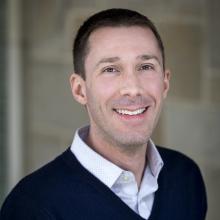Why did you decide to choose developmental science as a course of study or career?
After changing majors from music to psychology when I came out in college—and after growing up in Florida in the 1980s and ’90s—I wanted a career where I could have a role in working for change in the lives of LGBTQ+ young people. That path led me to complete my graduate work in counseling psychology, which was in a department with a developmental psychology program. The questions I had at the time around peer socialization of prejudice and bias-based harassment and how these could all change over time were grounded in developmental theories with research being done by developmental scientists (who themselves came from different backgrounds in psychology, sociology, and education). Attending the SRA and SRCD conferences and the peer relationships pre-conferences as a graduate student provided amazing opportunities for support and socialization into this field. Ultimately it led me to feel that this was the community of scholars I wanted to be with and that this would be a career with purpose.
Is there a mentor or mentors who have been instrumental to your studies and career path so far, and, if so, who and how?
It’s impossible to really convey how great an impact my mentors have had on my life or how meaningful it is to have them now as good friends. Mentorship continues long after grad school and even after making it to full professor. In my graduate program I had Lisa Spanierman and Dorothy Espelage provide unwavering encouragement and opportunities to receive the best training and research experience. Outside my program, Stephen Russell, Stacey Horn, and Ian Rivers took me under their wings at a time when there were few out LGBTQ+ developmental scholars. Arthur Lipkin and Hiro Yoshikawa both came into my life when I was an assistant professor and they have been models of what I could only hope to aspire toward in my life and in my work.
What advice would you give to a prospective graduate student thinking about beginning their Ph.D. studies in the developmental science field?
We are in a time of escalated attacks against LGBTQ+ communities and our work, with the aim to discredit, dehumanize, and erase both. Recently I was remembering Timothy Snyder’s book, On Tyranny, and the 20 lessons it contained. The final one, “Be as courageous as you can,” resonates. It is courageous, and an act of defiance and resistance, to choose to enter this field and to do this work in this moment. Our work is all the more urgent now, even while exacting a real and undeniable toll. But we survive and we persist together, and in that spirit my advice is to connect with others, from peers to senior scholars, not just for mutual support of one another’s research or career but to affirm one another’s meaning and value as people.
What is your best SRCD memory?
The 2021 all-virtual SRCD Biennial may not be the first thing that comes to people’s minds, unless you stayed logged in until the very end for the “versus” event among the Caucuses. Robert Marx and Alaina Brenick represented the SOGIE Caucus, and their cover of Madonna’s “Like a Prayer” among other hits—complete with costuming and wardrobe changes, lighting, and choreography—was exactly the kind of levity we needed at the height of the COVID-19 pandemic.
Why did you join the SOGIE Caucus and how does it facilitate connection among members all year long?
When the SOGIE Caucus was first established, it felt like it gave formal recognition to a growing informal network of friends and colleagues, from graduate students to senior scholars, who invested a lot to build community and to raise visibility of LGBTQ+ scholars and scholarship. It has been heartening to see the Caucus grow both in membership and mission, all in a relatively short period. I’m grateful to be a part of it, and I respect the tremendous amount of service that people have given within the Caucus to maintain connection and support among members through the adversities we now face and to spotlight and celebrate members’ milestones and achievements.
